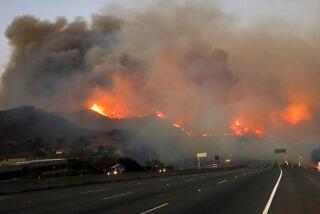A Fire Department for tough times
In recent years, the Los Angeles Fire Department, struggling to protect residents while cutting its budget, has turned to what it calls the “modified coverage plan.” Under that plan, 22 fire companies are closed on any given day and the firefighters are rotated to different companies, meaning that they often are responding to emergencies with colleagues they have not worked with and in communities they do not know well.
Now, facing still more budget cuts, leaders of the department have come up with a new approach that would trim the overall size of the force but end the modified coverage plan, without significantly increasing ambulance or fire truck response times. The City Council should approve it.
The plan is fiercely opposed by the city’s firefighter union, which views it as making permanent the cuts that the department has absorbed. Its leaders have drummed up public opposition by highlighting the closure of fire companies, the teams of firefighters and equipment that some neighborhoods will lose if the plan is approved. Some protesters, however, have misinterpreted those missives as suggesting that fire stations will be shuttered. That’s false. Not one of the city’s 106 stations would be closed. In addition, some have decried the prospect of laying off firefighters. That’s false too. The Fire Department’s proposed budget contemplates making all the cuts through attrition, leaving positions vacant for the next couple of years as firefighters retire or leave.
Most important is the question of whether the city would still be safe. Though that’s impossible to answer with certainty, the plan would ensure that more firefighters are on duty at any given time than is the case today, even as it reduces the overall size of the department.
Looming over this debate is another critical question: whether the city and its mayor are right to expect cuts from the Fire Department while continuing other, less essential services. It’s a question Mayor Antonio Villaraigosa has never answered satisfactorily, though in fairness, the council has rebuffed him when he’s tried. When he proposed selling city parking lots, for instance, the council rejected that sensible plan to dispense with a service that others could handle. Still, the mayor has yet to define what represents core services — police and fire, say — and what the city could learn to live without. Does it need to run a convention center? A zoo? Could it forgo investment in cultural affairs or street repairs in order to focus more on public safety?
Those are the tough questions the city government has largely avoided in its budget debates. Instead, it has asked for sacrifice from one of its core agencies, its vaunted Fire Department. Thankfully, the department has answered the call and produced a plan that will save money and lives too.
More to Read
A cure for the common opinion
Get thought-provoking perspectives with our weekly newsletter.
You may occasionally receive promotional content from the Los Angeles Times.










